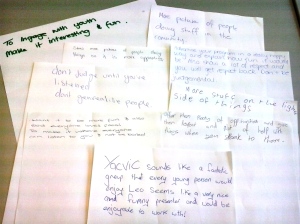“Look up, get up and never give up!” That was the message for young people from Karl, a student in the OzChild Pakenham VCAL (Victorian Certificate of Applied Learning) program. I visited with this group on 7 May to learn their ideas for the youth engagement resources project, and we enjoyed an energetic discussion about community and participation. And sloths (see below).
The young people saw engagement with, and taking part in, their community as:
- Getting involved
- Trying your hardest
- Raising awareness
- Connections with a group
- Leadership – taking charge
- Doing something for someone else
- Having a job, where you’re paid fairly [those students with jobs thought it unfair that they were paid less than adult workers]
Barriers to young people being an active part of the community included:
- Stereotypes of young people and judgement from older members of the community
- ‘Hypocritical’ attitude of some community members
- Young people lacking confidence to take part
- Young people lacking experience – difficult to get a job when you don’t already have the experience
- Young people being confused about what opportunities there are for them
- Adults not taking young people seriously
- Transport issues
Some ways to overcome these barriers were suggested as:
- Encouraging young people to voice their opinions and get their ideas out there
- Involving young people in local planning
- Getting a job where you’re not taken advantage of [by employers]
- Removing the stereotypes about young people
- Encouraging people to judge each other only in a positive way
We moved on to talk about the Taking Young People Seriously handbooks, and I invited the students to come up with concepts that would re-invent them for a ‘youth audience’. Their ideas were:
- More pictures of people doing stuff in the community
- More stuff on the lighter side of things
- Show more pictures of people doing things it is more appealing
- More colours; brighter colours
- Modern descriptions from young individuals
- More photos
- Videos
- Fancy fonts and fresher fonts
- Simpler contents and a proper index
- Internet [website]
- Less writing but more information
- Pop-outs
- Include contact numbers and internet addresses for services
- Include information about what to do to have our opinion heard
- Show how to get rid of stereotypes and hypocrites in the community
- Show how to get past being judged
- Include sloths [a joke that highlight a serious point, which was that the resources should include funny pictures or cartoons to be exciting]
Finally, I asked the group for their messages to include in the resources. Messages for adults were:
- Offer them [young people] plenty of opportunities and give them respect and a lot of help with things when you speak to them.
- Don’t judge until you’ve listened. Don’t generalise people.
- To engage with youth, make it interesting and fun.
- Advertise your program in a really happy way and explain how fun it would be. Also show a lot of respect and you will get respect back. Don’t be judgemental.
- Want it to be more fun and also food, everyone loves food. To make it where everyone can listen to you and not be bored.
And some messages for young people were:
- Don’t be nervous when thriving for success
- Look up, get up and never give up!
After the students left for the day, I spoke further with Jo and Andrew, the program staff, who made some insightful points from their practitioners’ points-of-view:
- There is a need to better link all local youth provision and youth services together; there is a current lack of information and networking
- A localised, youth-focused online hub would be very useful, e.g. something that includes resources, info-sharing about events and activities for young people. Perhaps local learning and employment networks (LLENs) could play a role in this.
Massive thanks to all the OzChild Pakenham VCAL students and Jo and Andrew for their excellent ideas throughout the session and thanks also to Ismail Taylor-Kamara, OzChild VCAL Coordinator, for arranging my visit.


